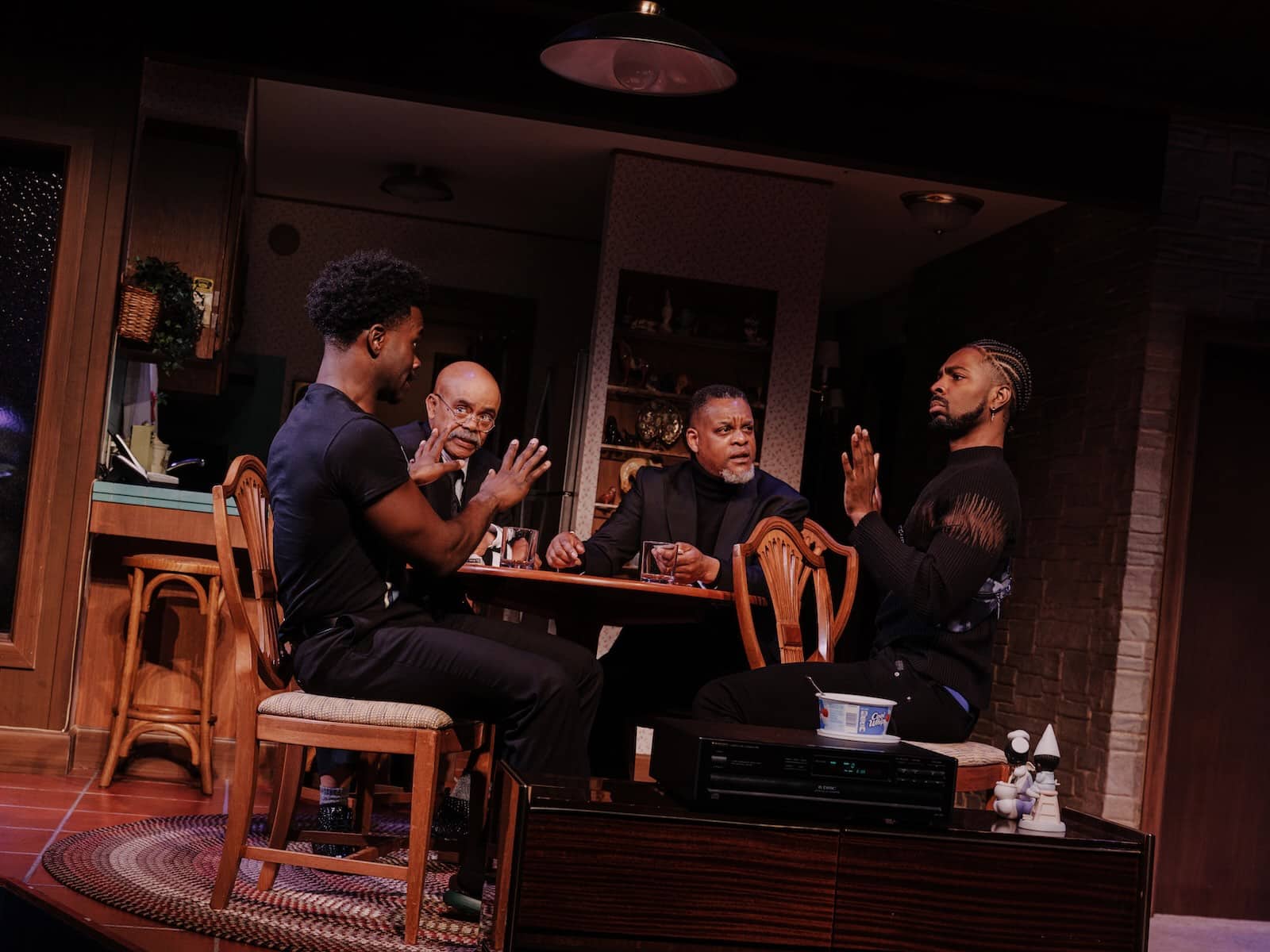Reggie D. White’s Fremont Ave. — now having its world premiere at Arena Stage in a co-production with South Coast Repertory — captures something rarely seen onstage: the shifting, tender, and turbulent bonds between Black men across generations.
The story unfolds over three acts that span six decades. In Act One (1968), George Plique (Bradley Gibson) falls in love with Audrey, a strong-willed housekeeper raising her son, Robert. In Act Two (1990s), George’s now-grown stepson Robert (Gibson) gathers with his friends Frank, Walter, and Tony for another of their legendary card games. And in Act Three (2020s), an older George and Robert reckon with their family legacies through Robert’s son, Joseph (Gibson again), who is gay, and Joseph’s lover, Damon, the son of Walter. (Gibson impressively plays three roles — George, Robert, and Joseph — across time.)

That simple throughline grounds a sprawling, funny, and emotionally raw play. White’s script is both wide-ranging and specific — rooted in the language, humor, and rituals that sustain Black male friendships even when words sting.
At its core, Fremont Ave. celebrates camaraderie: the card-table trash talk, the easy laughter, the enduring care that undergirds even the harshest arguments. The men call each other out, talk over one another, wound and forgive in a rhythm that feels lived-in.
George anchors it all. Gibson gives him a disarming gentleness in 1968 as a young music therapist with creative dreams and an almost naive belief in love. His tentative romance with Audrey (Jerrika Hinton, sharp and unsentimental) sparks the play’s emotional foundation. Audrey is practical, bruised by life, and wary of being rescued. When she storms out after George confesses his love, we fear it’s over — but her eventual return, humbled and open, becomes the origin point for the Plique family saga.
Around them orbit Wildlin Pierrevil’s peacekeeping Frank, Jeffrey Rashad’s sensitive Tony, and Stanley Andrew Jackson’s swaggering Walter. They’re professionals — lawyers and executives — but their connection transcends class. Lili-Anne Brown’s deft direction keeps the banter fluid and musical, with card games that seem to dance through time.
By Act Two, the setting has shifted to the 1990s, and the ensemble shines as the generational baton passes. Gibson reappears as Robert, now part of the card-table circle. The script ripples with the rhythms of age and inheritance: who has lived up to his potential, who has disappointed himself, and who’s pretending not to care. André Pluess’s sound design bridges the eras with a buoyant soundtrack — from disco to R&B to house — anchoring the men’s evolution in a vivid cultural timeline.

The play’s final act, set in the 2020s, shifts in tone and focus yet again. Older George (Doug Brown) and Older Robert (Kevin Mambo) face the emotional reckonings that come with age, legacy, and regret. Meanwhile, Robert’s son, Joseph, struggles to live authentically with his partner, Damon (a magnetic Galen J. Williams), who bursts in with a flamboyant, Vogue-inspired energy. Their chemistry — equal parts tender and defiant — feels like the next frontier of the story’s long meditation on Black masculinity.
At times, Fremont Ave. teeters on sitcom territory — especially in its late-play humor and a jarringly timed sexual interlude — but White always brings the focus back to love and survival. The generational scope is ambitious, and though some transitions blur, the emotional throughline remains strong.
A weaker thread is the portrayal of Audrey, who sometimes reads as a one-dimensional scold before morphing into a sainted matriarch offstage. Still, Hinton grounds her in pain and pride, and costumer Jos N. Banks gives her later-life “church lady” looks a visual authority that matches her evolution.
Tim Mackabee’s versatile set, with its mid-century furniture and clean architectural lines, transforms elegantly across eras. Lighting designer Kathy A. Perkins moves the action fluidly through decades — sunlight slanting across those back windows in one act, dusky blues signaling reflection in another. Each element reinforces Brown’s rhythmic pacing and the play’s musical pulse.
If there’s one historical beat missing, it’s the larger turbulence of 1968. The assassination of Dr. King and the nationwide grief that followed go unmentioned — a surprising omission in a work so invested in the emotional lives of Black men. Even a brief reference might have contextualized the deep ache of Act One and the prideful optimism of the third-act Obama-era nod.
Still, the piece lands as a triumph of spirit. White’s script captures both the sacred and the ridiculous in male friendship. His characters fight, forgive, drink, flirt, and age together. The production’s scale — ten fully drawn roles, multiple timelines, and a livewire sense of humor — makes Fremont Ave. feel both intimate and operatic.
By the time the older men reflect on their lives, the laughter and music echo like old memories. What remains is the bond — the unbreakable brotherhood that endures through heartbreak, shifting norms, and decades of change. On the 30th anniversary of the 1995 Million Man March, Fremont Ave. feels not just timely but necessary: a jubilant, complicated love letter to the Black men who show up for one another, generation after generation.
Running Time: Two hours and 30 minutes, including one 15-minute intermission.
Fremont Ave. plays through November 23, 2025, in the Kreeger Theater at Arena Stage at the Mead Center for American Theater, 1101 Sixth St SW, Washington, DC. Tickets ($49–$118) are available online or through TodayTix. Tickets may also be purchased through the Sales Office by phone at 202-488-3300, Tuesday through Sunday, 12-8 pm, or in person at 1101 Sixth Street SW, Washington, DC, Tuesday through Sunday, two hours before the show begins on performance days.
Arena Stage’s many savings programs include “pay your age” tickets for those aged 35 and under; military, first responder, and educator discounts; student discounts; and “Southwest Nights” for those living and working in the District’s Southwest neighborhood. To learn more, visit arenastage.org/savings-programs.
The program is online here.
Fremont Ave.
A Co-Production with South Coast Repertory
By Reggie D. White
Directed by Lili-Anne Brown
SEE ALSO:
Arena Stage announces cast and creative team for world premiere of ‘Fremont Ave.’ (news story, September 16, 2025)



